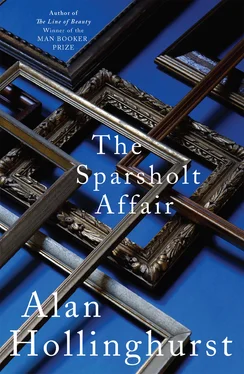Alan Hollinghurst - The Sparsholt Affair
Здесь есть возможность читать онлайн «Alan Hollinghurst - The Sparsholt Affair» весь текст электронной книги совершенно бесплатно (целиком полную версию без сокращений). В некоторых случаях можно слушать аудио, скачать через торрент в формате fb2 и присутствует краткое содержание. Год выпуска: 0101, Издательство: Pan Macmillan, Жанр: Старинная литература, на английском языке. Описание произведения, (предисловие) а так же отзывы посетителей доступны на портале библиотеки ЛибКат.
- Название:The Sparsholt Affair
- Автор:
- Издательство:Pan Macmillan
- Жанр:
- Год:0101
- ISBN:нет данных
- Рейтинг книги:5 / 5. Голосов: 1
-
Избранное:Добавить в избранное
- Отзывы:
-
Ваша оценка:
- 100
- 1
- 2
- 3
- 4
- 5
The Sparsholt Affair: краткое содержание, описание и аннотация
Предлагаем к чтению аннотацию, описание, краткое содержание или предисловие (зависит от того, что написал сам автор книги «The Sparsholt Affair»). Если вы не нашли необходимую информацию о книге — напишите в комментариях, мы постараемся отыскать её.
The Sparsholt Affair — читать онлайн бесплатно полную книгу (весь текст) целиком
Ниже представлен текст книги, разбитый по страницам. Система сохранения места последней прочитанной страницы, позволяет с удобством читать онлайн бесплатно книгу «The Sparsholt Affair», без необходимости каждый раз заново искать на чём Вы остановились. Поставьте закладку, и сможете в любой момент перейти на страницу, на которой закончили чтение.
Интервал:
Закладка:
‘Ah, Phil,’ said Charlie – behind us my own scout had come in to do the same for us.
I said sternly, ‘Do you know who this fellow is, Phil?’
Phil had fought at the Battle of Loos, and after that earlier war had spent fifteen years in the Oxford police. He was affable and devoted to the College, but seemed sometimes to regret that he’d ended up in an apron, dusting and washing dishes for young men he was powerless to discipline. ‘What was it, sir?’ He propped his screen against the wall, and came over eagerly, as if I’d spotted a miscreant. I noticed now that our own reflections were hanging very faintly between us and the view of other windows. I pointed upwards.
‘This . . . ridiculous fellow,’ I said.
‘Oh, him, sir,’ said Phil, a bit disappointed but trying for a moment to share our own interest in the luminous figure. ‘I happen to know there was a bit of trouble there.’
‘What sort of trouble?’ said Peter.
‘Well, the noise, sir. Dr Sangster’s been complaining about it.’
‘Oh . . . ?’ said Evert. ‘Noise . . . ?’
‘Rhythmical creaking, apparently, sir,’ said Phil, with a grim look.
‘Oh, goodness . . .’ said Evert.
‘He’s not one of ours, though, in fact,’ said Phil.
‘Ah,’ I said.
‘No, he’s one of the Brasenose men,’ said Phil. In the vast gloomy College, its staircases half-deserted since the start of the War, new members of requisitioned colleges had been slipped in here and there, disoriented freshmen who found themselves also evacuees. Brasenose had been seized by a ministry of some kind, who according to my tutor were rather unsure what to do with it. ‘If you could just excuse me, Mr Green?’
‘Of course, Phil.’
‘You don’t happen to know his name?’ said Jill.
‘He’s called Sparsholt, miss,’ said Phil, with a small cough as he swung the shutters to and dropped the iron bar safely in its slot.
‘ Spar . . . sholt ,’ said Peter, weighing the word and smiling slyly at Evert. ‘Sounds like part of an engine, or a gun.’
Phil looked at him blankly for a second or two. ‘I dare say you’re right, sir,’ he said, and went through into the bedroom. I set out my best Meissen cups, which I hoped might please Jill, and in the new closeness of the panelled and shuttered room we settled down to have tea.
Jill stayed on, as my guest, for dinner in Hall, and afterwards I went down to the gate with her. ‘I’ll see you back,’ I said. She was at St Hilda’s, a fifteen-minute walk away, but in the blackout a bit more of a challenge.
‘There’s absolutely no need,’ she said.
‘No, no, take my arm’ – which she did, touchingly enough. We set off – I held the taped-over torch which, with her elbow squeezed snugly against my side, we seemed to turn and point together. Even so, I sensed some reluctance in her. In a minute she freed herself to put on her gloves, and we went on like that past the tall railings of Merton, the great bulk of its chapel and tower sensed more than seen above us in the night. Jill glanced upwards. The darkness seemed to insinuate something between us, and though I think she was glad of my company it was awkwardly as though she had agreed to something. As I knew, it could be easier, once your eyes had adjusted, to walk without the startlements of the torch. Oddly, you moved with more confidence. All the same, we spoke nearly in whispers, as though we might be overheard. Often on those nights you did brush suddenly against other people passing or waiting entirely unseen.
Now the lane was a little black canyon, its gabled and chimneyed rim just visible to us against the deep charcoal of the sky. Clouds, in peacetime, carried and dispersed the colours of the lights below, but in the blackout an unmediated darkness reigned. I thought I knew this street I’d walked along a hundred times, but memory seemed not quite to match the dim evidence of doorways, windows, railings that we passed. I asked Jill about her work, and she at once grew less self-conscious. She was reading History, but her interests were in archaeology, and in the remarkable things revealed by the London Blitz. She explained how bombs that knocked down City churches sometimes cut through the layers below, Tudor, medieval, Roman, exposing them in ways no organized human effort could have done. The human aspects of the devastation, the loss of life and home, clearly struck her rather less. She spoke excitedly about coins, coffins, bricks, fragments of pottery. I said it must be frustrating for her that Oxford itself had barely been damaged, and watched, if one can watch in the dark, her recognition, and disposal, of a joke. From the start she’d been one of those who pass through student life with their eyes set firmly on the future: it was an urgent process, not a beautiful delay. Now the future for all of us had changed, the town pervaded by a mood of transience, and of near-readiness for action which it never saw. Did other friends share my feeling we might lose the War, and soon? – defeatist talk was rare, and censored itself as it began. Jill had made her choice, for the army, but her mind was on the great things she would do once the War was won.
At the gate of St Hilda’s I stood half-illuminating our parting. ‘Good night then,’ I said, with a humorous tremor.
Jill seemed to look over my shoulder. ‘I wonder if Peter will paint that man.’
I turned. ‘Who’s that?’
‘The new man,’ she said, ‘Sparsholt.’
‘Oh, him.’ I laughed. ‘Well, Peter generally gets what he wants.’
‘A good subject, anyway, I’d have thought,’ said Jill, and we shook hands. It wasn’t what I’d hoped for, and as I walked alone across the bridge, and then once more down Merton Lane, I worried at my own timidity and planned more confident advances when we met next time. I turned her face to mine, and found beauty in its symmetry. She had grey eyes, the strong chin of a Wagnerian soprano, and small white teeth. She gave off, close to, a tantalizing scent. For the moment, this would have to do.
2
Evert wrote to his father, and came round a few days later to say that our invitation had been accepted: Victor Dax would be more than happy to address the Club. The great man’s letter was short and virtually illegible; the notepaper was headed with a murky crest and the motto ‘Montez Toujours’. ‘We’ll put him down for fifth week, shall we?’ – I smiled confidently and started to feel nervous myself about whether people would come.
Evert was still in khaki, having spent the past hour or so being marched back and forth along the great stone terraces of Tom Quad by old Edmund Blunden. I mean Blunden seemed old to us, when he came in to teach drill or to take the reluctant volunteers out on map-reading courses, though in fact he was still in his forties, a small bird-like figure with shadowy reserves of knowledge. I almost envied them their forays out to Cumnor Hill or Newnham Courtenay, overlaid, as I saw them, on a spectral map of the earlier war he had witnessed and written about. But Evert hated it all, and looked wretched in uniform; he marched, on the couple of times I’d seen him training, with an air of slighted dignity, close to insubordination.
He sat down and picked up a book with a just perceptible awareness of becoming a regular guest in my rooms. We had known each other a little in his first year, and now that all the friends he’d made then had been called up he clearly felt lonely. No doubt he dreaded the fast-approaching moment when he would be called up himself. There was something unsettled about him, his pale, dark-eyed face under its tumbling forelock gave hints of feelings that he rarely expressed. To me he had all his own interest, and then the glamour, and the burden, of his short but famous name. It had always been a part of his appeal to me that he was A. V. Dax’s son; just as it was a sign of our friendship that I half-forgot the fact. To him it was a knottier and more inescapable matter. He sighed and put the book down, and showed me another letter, from his mother – I gathered that his parents, though still together in their house in Chelsea, led semi-independent lives, but I didn’t feel I could ask more. It wasn’t clear how much Evert himself understood of the situation. His mother’s letter described the terrors of the Blitz in a cheerfully carping way. She said that his father had laughed when she’d flung herself on to the ground as a bomb came down, and ruined a good coat; he himself refused to go into the shelters with the ordinary people.
Читать дальшеИнтервал:
Закладка:
Похожие книги на «The Sparsholt Affair»
Представляем Вашему вниманию похожие книги на «The Sparsholt Affair» списком для выбора. Мы отобрали схожую по названию и смыслу литературу в надежде предоставить читателям больше вариантов отыскать новые, интересные, ещё непрочитанные произведения.
Обсуждение, отзывы о книге «The Sparsholt Affair» и просто собственные мнения читателей. Оставьте ваши комментарии, напишите, что Вы думаете о произведении, его смысле или главных героях. Укажите что конкретно понравилось, а что нет, и почему Вы так считаете.












